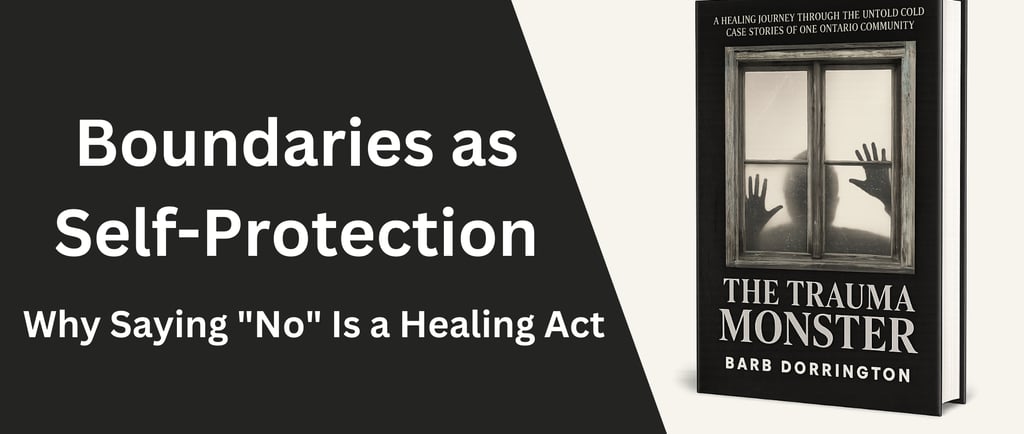Boundaries as Self-Protection: Why Saying "No" Is a Healing Act
Barb Dorrington
9/1/20252 min read


If you’re a trauma survivor, chances are the word “no” hasn’t always felt safe.
Maybe you were punished for setting boundaries, or maybe you were never taught you had the right to have them. Over time, it became easier to go along with things—even if it meant abandoning your own needs, comfort, or safety.
In The Trauma Monster, Barb Dorrington sheds light on this common trauma response and emphasizes why learning to say "no" is not only a survival skill—it’s a healing act of self-protection and self-respect.
Why Boundaries Are Hard After Trauma
Trauma often comes with the message: "Your needs don’t matter." Whether it was childhood neglect, emotional manipulation, or any form of abuse, survivors internalize the idea that pleasing others is safer than protecting themselves.
This might show up in adulthood as:
Saying yes when you mean no
Avoiding conflict at all costs
Feeling guilty for taking up space or expressing needs
Struggling to enforce limits even when you feel violated
These patterns are protective—but they’re also exhausting. Over time, they erode self-worth and reinforce the trauma narrative that your safety depends on keeping others happy.
Reclaiming “No” as a Healing Tool
Setting boundaries doesn’t mean you’re rude, selfish, or unkind. It means you’re honoring your nervous system, your capacity, and your healing.
Every time you say “no” when you need to, you’re telling your inner child: You are worth protecting now.
Here’s what makes boundaries so powerful:
They create safety. Boundaries protect your energy, time, and emotional well-being.
They foster self-trust. Saying no builds confidence in your ability to stand up for yourself.
They clarify relationships. Healthy boundaries show others how to respect and engage with you.
They support healing. Boundaries reduce re-traumatization and help regulate your nervous system.
How to Begin Setting Boundaries (Without the Guilt)
Start Small
Practice saying no to things that aren’t high-stakes. Decline an invitation. Cancel a plan. Pause before replying.Use Clear Language
You don’t need to over-explain. "That doesn’t work for me" is enough.Expect Discomfort
Boundaries may feel uncomfortable at first—especially if you’ve spent years ignoring your own needs. That doesn’t mean they’re wrong.Validate Yourself
Remind yourself: “I’m allowed to say no. I’m allowed to take care of myself. My needs matter.”Celebrate Each Step
Every time you set a boundary, you’re rewriting the script trauma wrote for you. That deserves to be acknowledged.
Boundaries Are an Act of Self-Love
As Barb Dorrington writes, the trauma monster loses power each time we listen to ourselves with compassion. Saying “no” can feel terrifying—but it’s also one of the most liberating things a survivor can do.
You don’t have to earn the right to have boundaries. You were born with that right. And every step you take toward protecting your peace is a powerful declaration:
I am worthy of safety.
I am allowed to choose.
I am no longer available for what hurts me.


